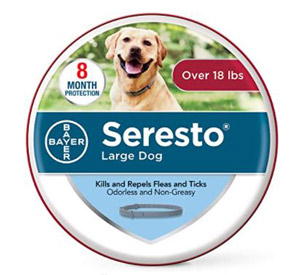Issue Spotlighted by More Than 100,000 Harm Reports About Seresto Flea Collars
March 2, 2024 - WASHINGTON— A scathing report released on Thursday by a federal oversight agency revealed that the Environmental 
Following more than 100,000 reports of Seresto’s harm to pets — including more than 3,000 deaths — the EPA announced in July 2023 that it would limit approval of the product to five years and require more detailed reporting of harm incidents from the flea collar’s maker, Elanco.
However, today’s Office of the Inspector General report found that the EPA’s Office of Pesticide Programs has outdated and unreliable systems and lacked enough information to conclude that Seresto collars can be used safely.
“This report exposes in disturbing detail what many of us have known all along, that the EPA’s oversight of Seresto is absolutely abysmal,” said Nathan Donley, environmental health science director at the Center for Biological Diversity. “We urge the agency to quickly implement all the recommendations from the Inspector General’s Office and finally begin to protect the public instead of neglecting its duties.”
Among the report’s findings:
- The EPA continues to rely on incomplete or outdated studies to keep the pet collars on the market;
- The agency did not conduct a necessary risk assessment for use of the Seresto pet collar on domestic pets;
- The EPA lacks proper standards for determining whether pesticides used on pets pose serious risks to people or pets;
- The EPA’s incident reporting system lacks adequate information to assess the harms from pesticide exposure.
In 2021 the Center for Biological Diversity filed a formal legal petition urging the EPA to cancel the Seresto collar’s registration. The agency refused to cancel the product but put in place a five-year limit on Seresto’s approval and required more detailed reporting from the collar’s maker. The Inspector General’s report said the EPA’s response to the concerns raised by the petition was inadequate.
Today’s report comes just weeks after a judge granted preliminary approval to a $15 million settlement of a class action lawsuit filed by pet owners against the makers of Seresto collars.
Last year the U.S. House Subcommittee on Economic and Consumer Policy held an oversight hearing and released a report based on a year-long investigation detailing the EPA’s failure to take action to protect pets from harms associated with the Seresto collars.
The committee’s report detailed how Seresto had a much higher number of total incidents and “major” and “death” incidents than any other flea and tick treatments, even when accounting for the number of collars sold.
In 2023 the EPA announced that it would make the most recent 10 years of pesticide incident reports available to the public in a searchable database to be updated every month. Today’s report, however, said the information submitted with incident reports often lacks detail and in most cases provides little useable information.
The Center for Biological Diversity is a national, nonprofit conservation organization with more than 1.7 million members and online activists dedicated to the protection of endangered species and wild places.
Source: Center for Biological Diversity








